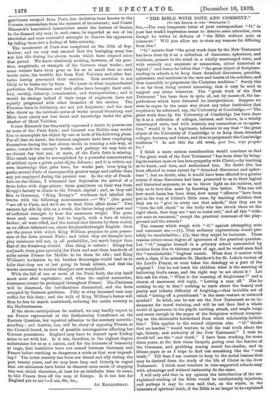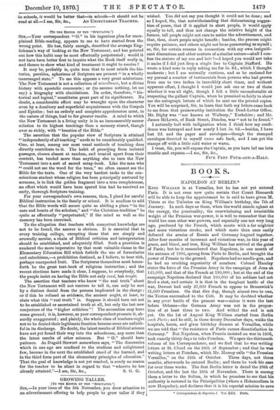"THE BIBLE WITH NOTE AND COMMENT." (TO TRH EDITOR OP
THE "SPECTATOR.")
Sin,—The very temperate letter of your correspondent " 0." in your last week's impression seems to deserve some attention, even though he writes in defence of " the Bible without note or comment." Will you allow me to state my reasons for differing from him ?
"O." asserts that "the great work done by the Nets Testament has been done by it as a collection of discourses, aphorisms, and incidents, present to the mind in a wholly unarranged state, and with scarcely any sequence or connection, either historical or logical ;" and hence he infers that " the great object of Scripture- reading in schools is to keep these detached discourses, parables, aphorisms, and incidents in the ears and hearts of the scholars, an& thus insensibly to perpetuate the Christian tradition." Surely this- is so far from being correct reasoning, that it may be used to- support any abuse whatever. The " great work of the New Testament " has been done in spite of, not by means of, the im- perfections which have distorted its interpretation. Suppose we- were to argue in the same way about any other institution that requires to be reformed, say, the University of Cambridge,—" The great work done by the University of Cambridge has been done- by it as a collection of colleges, lectures, and tutors, in a wholly unarranged state, and with scarcely any connection or co-opera-- tion," would it be a legitimate inference to say that " the great object of the University of Cambridge is to keep these detached colleges, lectures, and tutors, and thus to perpetuate the Cambridge tradition "? Is not this the old error, post hoc, ergo propter- hoc ?
I think a more serious consideration would convince us that " the great work of the New Testament " has been done by bring- ing its readers more or less into sympathy with Christ,—by teaching. us to know, and love, and understand him. No doubt this has been effected to some extent by " detached discourses and aphor- isms "; but no doubt, also, it would have been effected to a greater extent if these discoUrses had been presented to us in their logical, and historical sequence, so as to throw light on his motives, and help us to love him more by knowing him better. Who can tell, how much harm has been done, how many " offences " have been, put in the way of Christ's little ones,- by teaching children that, they are to " give to every one that asketh," that they are to- " turn the left cheek" to the bully who has struck them on the- right cheek, that they are " not to resist evil," and all this "with-- out note or comment," except the practical comment of the play- ground and the streets?
The reasons which weigh with " 0." against attempting note- and comment are :—(l), That ordinary explanations would pro- bably be unscholarlike ; (2), that they might be insincere. These- reasons evince some degree of ignorance of the practical question. Let " 0." imagine himself in a primary school surrounded by urchins from five to thirteen years of age, and he would soon find, the " unscholarlike " bugbear vanish. What does it matter with, such a class, if he mistakes St. Matthew's for St. Luke's version of the Lord's Prayer, or even takes the doxology as a part of the- original ? Can he not teach his children what is the meaning of hallowing God's name, and the right way to set about it ? Let him ask his class, " What is the meaning of forgiveness ?" and a. chorus of answerers will reply, " Letting a man off." Has he: nothing to say to that ? nothing to teach about the beauty and. purity and infinite difficulty of forgiving,—that invisible act of which " letting off a punishment " is the mere vesture or outward, symbol? In brief, can he not use the New Testament as an in- strument for moral training, and will he not then find a whole- world of ignorance in his pupils inviting attack, and ample verge and room enough in the pages of the Scriptures without trespass- ing on the debateable borderland from which scholarship forbids• him ? This applies to the second objection also. " 0." thinks that no teacher " would venture to tell the real truth about the age, history, and authority of the New Testament." I wish he- would tell me the " real truth." I have been working for some three years, at the first three Gospels, poring over the fancies of the Germans, and grubbing among uncial fac-similes, and in, fifteen years or so I hope to find out something like the " real truth." Till then I am content to keep to the moral lessons that. may be derived from the study of the life of Christ in the New Testament. I think most teachers in rate-supported schools may with advantage and without insincerity do the same.
I will only add that in my opinion the introduction of the un- explained reading of the Bible would be intellectually injurious, and perhaps it may be even said that, on the whole, in the interests of spiritual truth, if the Bible is no longer to be explained
in schools, it would be better that—in schools—it should not be



































 Previous page
Previous page